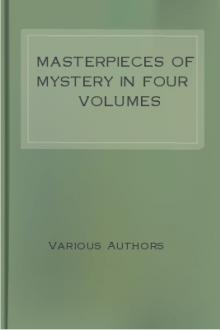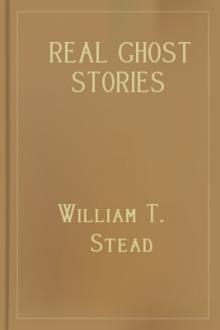Varney the Vampire; Or, the Feast of Blood by Prest and Rymer (ereader iphone .txt) 📗

- Author: Prest and Rymer
Book online «Varney the Vampire; Or, the Feast of Blood by Prest and Rymer (ereader iphone .txt) 📗». Author Prest and Rymer
"So he can."
"Hurra!" shouted the mob, as a tall flame shot through the top windows of the house.
The fire had got the ascendant now, and no hopes could be entertained, however extravagant, of saving the smallest article that had been left in the mansion.
"Hurra!" shouted the mob with the military, who came up with them.
"Hurra!" shouted the others in reply.
"Quick march!" said the officer; and then, in a loud, commanding tone, he shouted, "Clear the way, there! clear the way."
"Ay, there's room enough for you," said old Mason; "what are you making so much noise about?"
There was a general laugh at the officer, who took no notice of the words, but ordered his men up before the burning pile, which was now an immense mass of flame.
The mob who had accompanied the military now mingled with the mob that had set the house of Sir Francis Varney on fire ere the military had come up with them.
"Halt!" cried out the officer; and the men, obedient to the word of command, halted, and drew up in a double line before the house.
There were then some words of command issued, and some more given to some of the subalterns, and a party of men, under the command of a sergeant, was sent off from the main body, to make a circuit of the house and grounds.
The officer gazed for some moments upon the burning pile without speaking; and then, turning to the next in command, he said in low tones, as he looked upon the mob,—
"We have come too late."
"Yes, much."
"The house is now nearly gutted."
"It is."
"And those who came crowding along with us are inextricably mingled with the others who have been the cause of all this mischief: there's no distinguishing them one from another."
"And if you did, you could not say who had done it, and who had not; you could prove nothing."
"Exactly."
"I shall not attempt to take prisoners, unless any act is perpetrated beyond what has been done."
"It is a singular affair."
"Very."
"This Sir Francis Varney is represented to be a courteous, gentlemanly man," said the officer.
"No doubt about it, but he's beset by a parcel of people who do not mind cutting a throat if they can get an opportunity of doing so."
"And I expect they will."
"Yes, when there is a popular excitement against any man, he had better leave this part at once and altogether. It is dangerous to tamper with popular prejudices; no man who has any value for his life ought to do so. It is a sheer act of suicide."
CHAPTER LIV. THE BURNING OF VARNEY'S HOUSE.—A NIGHT SCENE.—POPULAR SUPERSTITION.The officer ceased to speak, and then the party whom he had sent round the house and grounds returned, and gained the main body orderly enough, and the sergeant went forward to make his report to his superior officer.
After the usual salutation, he waited for the inquiry to be put to him as to what he had seen.
"Well, Scott, what have you done?"
"I went round the premises, sir, according to your instructions, but saw no one either in the vicinity of the house, or in the grounds around it."
"No strangers, eh?"
"No, sir, none."
"You saw nothing at all likely to lead to any knowledge as to who it was that has caused this catastrophe?"
"No, sir."
"Have you learnt anything among the people who are the perpetrators of this fire?"
"No, sir."
"Well, then, that will do, unless there is anything else that you can think of."
"Nothing further, sir, unless it is that I heard some of them say that Sir Francis Varney has perished in the flames."
"Good heavens!"
"So I heard, sir."
"That must be impossible, and yet why should it be so? Go back, Scott, and bring me some person who can give me some information upon this point."
The sergeant departed toward the people, who looked at him without any distrust, for he came single-handed, though they thought he came with the intention of learning what they knew of each other, and so stroll about with the intention of getting up accusations against them. But this was not the case, the officer didn't like the work well enough; he'd rather have been elsewhere.
At length the sergeant came to one man, whom he accosted, and said to him,—
"Do you know anything of yonder fire?"
"Yes: I do know it is a fire."
"Yes, and so do I."
"My friend," said the sergeant, "when a soldier asks a question he does not expect an uncivil answer."
"But a soldier may ask a question that may have an uncivil end to it."
"He may; but it is easy to say so."
"I do say so, then, now."
"Then I'll not trouble you any more."
The sergeant moved on a pace or two more, and then, turning to the mob, he said,—
"Is there any one among you who can tell me anything concerning the fate of Sir Francis Varney?"
"Burnt!"
"Did you see him burnt?"
"No; but I saw him."
"In the flames?"
"No; before the house was on fire."
"In the house?"
"Yes; and he has not been seen to leave it since, and we conclude he must have been burned."
"Will you come and say as much to my commanding officer? It is all I want."
"Shall I be detained?"
"No."
"Then I will go," said the man, and he hobbled out of the crowd towards the sergeant. "I will go and see the officer, and tell him what I know, and that is very little, and can prejudice no one."
"Hurrah!" said the crowd, when they heard this latter assertion; for, at first, they began to be in some alarm lest there should be something wrong about this, and some of them get identified as being active in the fray.
The sergeant led the man back to the spot, where the officer stood a little way in advance of his men.
"Well, Scott," he said, "what have we here?"
"A man who has volunteered a statement, sir."
"Oh! Well, my man, can you say anything concerning all this disturbance that we have here?"
"No, sir."
"Then what did you come here for?"
"I understood the sergeant to want some one who could speak of Sir Francis Varney."
"Well?"
"I saw him."
"Where?"
"In the house."
"Exactly; but have you not seen him out of it?"
"Not since; nor any one else, I believe."
"Where was he?"
"Upstairs, where he suddenly disappeared, and nobody can tell where he may have gone to. But he has not been seen out of the house since, and they say he could not have gone bodily out if they had not seen him."
"He must have been burnt," said the officer, musingly; "he could not escape, one would imagine, without being seen by some one out of such a mob."
"Oh, dear no, for I am told they placed a watch at every hole, window, or door however high, and they saw nothing of him—not even fly out!"
"Fly out! I'm speaking of a man!"
"And I of a vampire!" said the man carelessly.
"A vampyre! Pooh, pooh!"
"Oh no! Sir Francis Varney is a vampyre! There can be no sort of doubt about it. You have only to look at him, and you will soon be satisfied of that. See his great sharp teeth in front, and ask yourself what they are for, and you will soon find the answer. They are to make holes with in the bodies of his victims, through which he can suck their blood!"
The officer looked at the man in astonishment for a few moments, as if he doubted his own ears, and then he said,—
"Are you serious?"
"I am ready to swear to it."
"Well, I have heard a great deal about popular superstition, and thought I had seen something of it; but this is decidedly the worst case that ever I saw or heard of. You had better go home, my man, than, by your presence,





Comments (0)